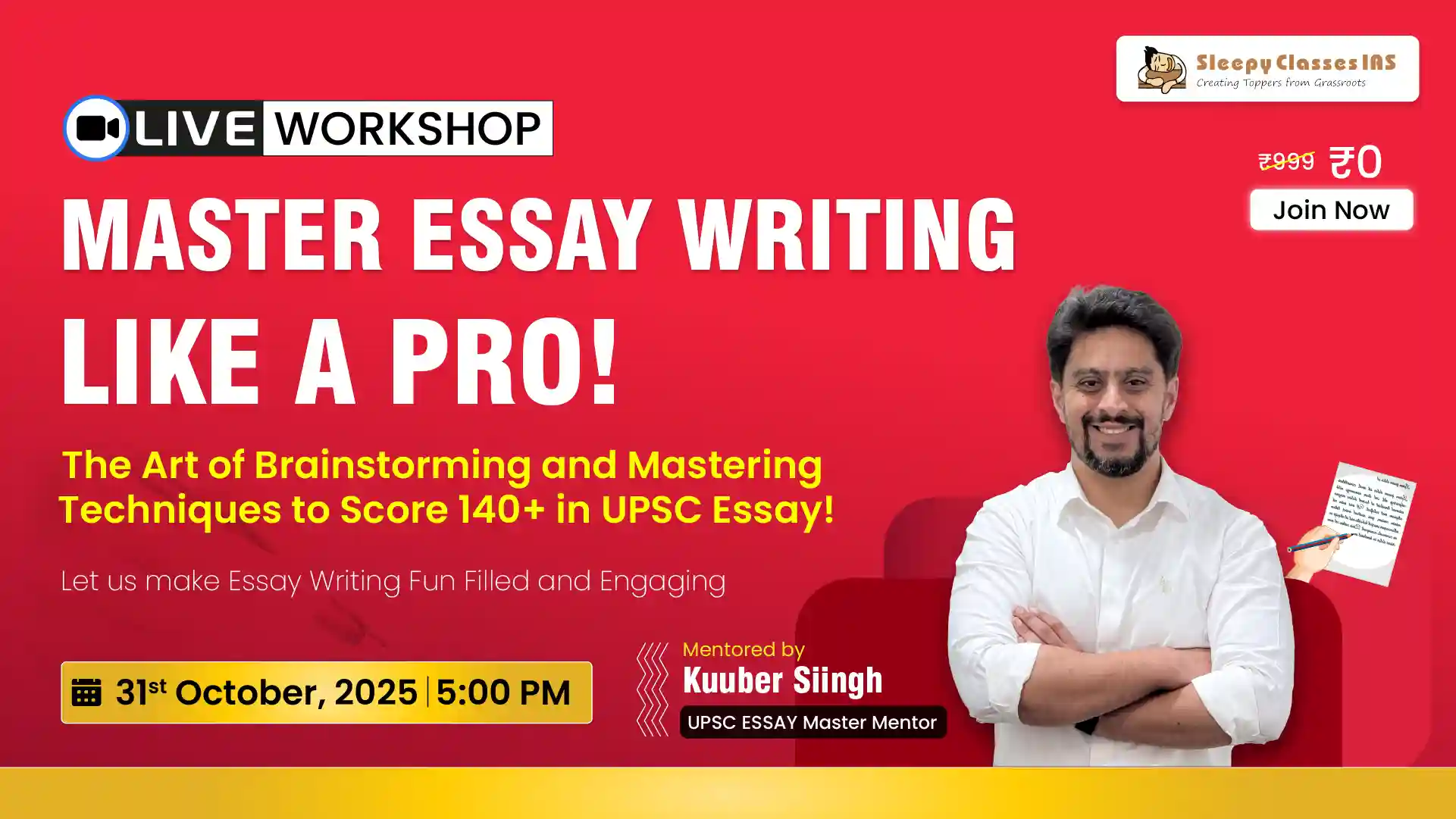Preparing for the UPSC exam is a challenging endeavour, especially for working professionals who must balance their job responsibilities with rigorous study schedules. This article provides essential tips to help working professionals master their UPSC preparation while highlighting the benefits of using Sleepy Classes, a popular online coaching platform known for its comprehensive and flexible learning programs.
Key Takeaways
- Effective time management is crucial for balancing work and UPSC preparation.
- Setting realistic and achievable goals can help maintain steady progress.
- Leveraging weekends and holidays for intensive study sessions can be highly beneficial.
- Utilizing online resources, such as Sleepy Classes, can provide flexible and comprehensive learning options.
- Maintaining mental health and motivation is essential to avoid burnout and stay focused on the goal.
Balancing Work and UPSC Preparation
Balancing work and UPSC preparation can be challenging, but with the right strategies, it is achievable. Here are some essential tips to help you manage both effectively.
Creating a Study Plan that Works
Creating a study plan that works is crucial for UPSC preparation, especially for working professionals. A well-structured plan can help you balance your job and studies effectively.
Effective Use of Sleepy Classes for UPSC Success
Sleepy Classes has become a popular choice among UPSC aspirants due to its comprehensive and strategic guidance. The platform offers a variety of courses tailored to meet the needs of different students, ensuring that each one can find a program that suits their preparation style. Their courses emphasize analytical skills and answer writing, supported by video lectures, doubt-clearing sessions, and continuous assessments. This holistic approach helps students grasp complex topics and apply their knowledge effectively in exams.
Maintaining Motivation and Mental Health
Dealing with Burnout
Burnout is a common issue among UPSC aspirants, especially for working professionals. It’s essential to recognize the signs early and take proactive steps to address them. Focus on progress rather than perfection to keep yourself motivated. Regular breaks and a balanced schedule can help in maintaining a healthy work-life balance.
Staying Positive
Maintaining a positive mindset during UPSC preparation is crucial. Stay motivated and focused on your goals; approach challenges and obstacles with a problem-solving attitude. Celebrate small victories to keep your spirits high. Remember, every step forward is progress.
Building a Support System
A strong support system can make a significant difference in your preparation journey. Surround yourself with people who understand your goals and can offer encouragement. Join study groups or online forums to connect with fellow aspirants. This not only provides moral support but also helps in sharing resources and strategies.
It’s crucial to cultivate a positive mental state and ward off negative thoughts, empowering us to reach our maximum potential.
Optimizing Answer Writing Skills
Practicing Regularly
Consistent practice is key to mastering answer writing for the UPSC exam. Make it a habit to write answers daily, focusing on different subjects and question types. This will help you develop the skill to articulate your thoughts clearly and concisely.
Analyzing Previous Year Papers
Reviewing previous year papers is an excellent way to understand the pattern and types of questions asked. By analyzing these papers, you can identify common themes and important topics, which will guide your preparation.
Seeking Feedback from Experts
Getting feedback from mentors or experts can significantly improve your answer writing skills. They can provide valuable insights and point out areas for improvement, helping you refine your technique.
Keep practicing answer writing. Since the main examination is descriptive in nature, practice writing essays, and answers. It will help you develop the skill to present your knowledge effectively.
Integrating Current Affairs into Your Study Routine
Staying updated with current affairs is crucial for UPSC preparation. Daily news analysis is a must. Make it a habit to read newspapers like The Hindu or Indian Express every day. This will help you stay informed about the latest events and developments.
Monthly current affairs magazines are also beneficial. They provide a comprehensive overview of important events and issues. Magazines like Yojana and Kurukshetra are highly recommended.
Connecting current events with the syllabus is essential. Try to relate news articles to the topics in your UPSC syllabus. This will help you understand the relevance of current affairs in the context of the exam.
The best strategy for current affairs preparation is to make notes. The following process of notes making requires very hard work but believe me it will fetch great results.
Maximizing the Benefits of Mock Tests
Mock tests are an indispensable tool in UPSC preparation. They help simulate the actual exam conditions, allowing aspirants to get a feel of the real test environment. Simulating exam conditions is crucial as it helps in managing time effectively and reducing anxiety on the exam day. By regularly taking mock tests, candidates can identify their weak areas and focus on improving them.
Simulating Exam Conditions
Mock tests are designed to replicate the actual UPSC exam environment. This includes the time constraints and the pressure of answering questions accurately. Practicing under these conditions helps in building the stamina required for the actual exam.
Reviewing Performance
After completing a mock test, it is essential to review your performance thoroughly. This involves analyzing the questions you got wrong and understanding the reasons behind your mistakes. This step is crucial for continuous improvement.
Identifying Weak Areas
Mock tests provide a clear picture of your strengths and weaknesses. By identifying the subjects or topics where you are lagging, you can allocate more time to those areas in your study plan. This targeted approach ensures a more balanced preparation.
For the mains exam, answer writing skills are paramount. Mock tests provide ample opportunities to practice writing structured, coherent, and concise answers.
Maximizing the benefits of mock tests is crucial for your UPSC preparation. Mock tests not only help you gauge your current level of understanding but also familiarize you with the exam pattern and time management. To make the most out of your preparation, join our comprehensive test series and courses designed to give you an edge. Visit our website today and start your journey towards success!
Conclusion
Mastering UPSC preparation as a working professional is undoubtedly a challenging yet achievable goal. By integrating strategic planning, disciplined time management, and leveraging quality resources, aspirants can navigate the complexities of the UPSC exam effectively. Institutions like Sleepy Classes offer comprehensive programs that cater to the unique needs of working professionals, providing flexible learning options, expert guidance, and continuous assessment to ensure a well-rounded preparation. Their success stories, such as that of Medha Anand, underscore the effectiveness of their approach. Ultimately, with the right mindset and support system, working professionals can excel in their UPSC journey and achieve their aspirations.
Frequently Asked Questions
How can working professionals effectively balance UPSC preparation with their job?
Balancing work and UPSC preparation requires disciplined time management, setting realistic goals, and leveraging weekends effectively. Prioritize tasks and create a study schedule that accommodates both work and study hours.
What are some time management techniques for UPSC aspirants who are also working professionals?
Time management techniques include creating a daily schedule, breaking down study sessions into manageable chunks, using productivity tools, and adhering to a consistent routine. Focus on high-yield topics during short study periods.
How can Sleepy Classes help in UPSC preparation for working professionals?
Sleepy Classes offers flexible online courses, video lectures, doubt-clearing sessions, and continuous assessments. These resources are designed to fit into the busy schedules of working professionals, providing comprehensive and strategic guidance.
What are the benefits of using online resources like Sleepy Classes for UPSC preparation?
Online resources like Sleepy Classes offer flexibility, access to expert knowledge, interactive learning methods, and a supportive community. They provide specialized programs and study material that cater to the dynamic nature of the UPSC exam.
How can I stay motivated and maintain mental health during UPSC preparation while working?
Maintaining motivation and mental health involves setting realistic goals, taking regular breaks, staying positive, and building a support system. Engage in activities that reduce stress and seek support from family, friends, or mentors.
What strategies should I use to integrate current affairs into my UPSC study routine?
Integrate current affairs by dedicating time daily for news analysis, subscribing to monthly current affairs magazines, and connecting current events with the UPSC syllabus. Utilize online platforms and resources to stay updated.






